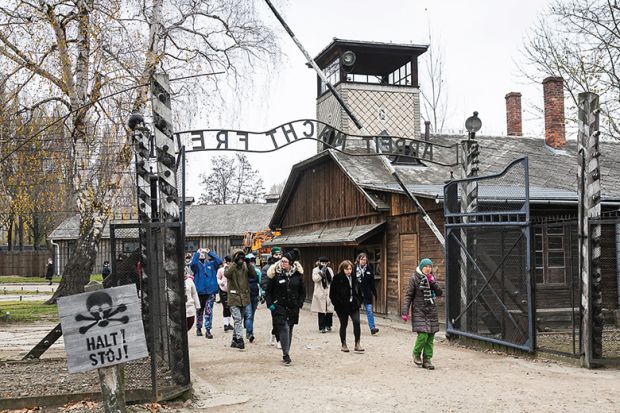For one student, it was the hair that disturbed her most. It is not the first sight for visitors to Auschwitz-Birkenau, but it is one of the most shocking – the enormous pile of locks, all faded to the same shade of brown, some still in pigtails. Nearby there are heaps of spectacles, which resemble electrical wiring; suitcases labelled with the names of their owners; shoes; and artificial limbs.
For other students, it was standing in the freezing cold on the railway tracks – where in just eight weeks in 1944 more than 400,000 Hungarian Jews arrived in freight cars – that brought home the horrors of the Holocaust.
These were just two parts of the Holocaust Educational Trust’s first opportunity to take students and staff from UK universities to visit the former Nazi concentration and death camp, organised in partnership with the UK’s Union of Jewish Students.
While the trust has arranged more than 200 visits for school pupils and teachers over the past 19 years, this was the first time that a trip had been organised for students’ union sabbatical officers and senior university leaders, following a grant from the Ministry of Housing, Communities and Local Government and the Department for Education.
During the one-day trip, 93 sabbatical officers and 29 university staff from across 40 English universities visited Oświęcim, the town where the camp was located; the barracks and crematoria of Auschwitz I; and the main killing centre of Birkenau. As part of the programme, students will also attend seminars, hear from a Holocaust survivor, and become HET ambassadors, disseminating what they have learned to their peers and wider community.
Karen Pollock, chief executive of the HET, said that the project was established in the wake of a rise in antisemitism on British campuses. Last year saw a record annual number of antisemitic hate incidents in the UK, a total of 1,414, according to the Community Security Trust.
Ms Pollock said that the students and staff participating in the project “have a role going forward to make sure that not only is the memory kept alive and that this history is known about, but to make a difference in the future”.
“It could be that they mark Holocaust Memorial Day, it could be that there’s more engagement between different faith groups on campus, it could be that there’s an understanding of when you need to intervene when certain issues rear their heads,” she said.
Tom Oladipo, community officer at the University of Leeds students’ union, said that there was “a slight friction between the Palestine Solidarity Group and the Jewish Society” at his institution, and he chose to go on the trip to help him put the conflict into historical context.
Meanwhile, Ahmed Mahbub, president of the students’ union at Queen Mary University of London, said that statistics on the Holocaust “dehumanise” what happened, but visiting Auschwitz brought across the personal stories of the victims and the huge scale of the camp. He said that he would encourage students at his institution to visit.
Giles Carden, chief of staff at Lancaster University, said that “the rise of fascism happened because of a major economic crash early in the 20th century. We had another one 10 years ago and you’re seeing the rise of extremism again and it’s got to be stamped out at an early stage.”
While he welcomed the new university programme, he said that it should not be limited to only sabbatical officers, but extended to the “broader community of students”.
At the end of the visit to Auschwitz, Andrew Shaw, a rabbi and chief executive of Mizrachi UK, which calls itself “the centre for religious Zionism in the UK”, said that recent terrorist attacks and displays of antisemitism had made him “realise that the things that started the Holocaust in the 1920s and 1930s haven’t disappeared”, and he urged students to “make a difference”.
Sitting in the departure lounge at Kraków airport, Shakira Martin, president of the National Union of Students, said that she felt a “duty to ensure that the stories of the survivors continue”.
“For me it’s about…helping students across all campuses have a better understanding of the Holocaust and supporting Jewish students on campuses,” she said.
“I know now that I’m going to be brave enough to speak up when things don’t sound right and to challenge behaviours. I have a duty to challenge this because I feel like if I don’t, I am part of this problem.”
POSTSCRIPT:
Print headline: Learning from the horrors of the past
Register to continue
Why register?
- Registration is free and only takes a moment
- Once registered, you can read 3 articles a month
- Sign up for our newsletter
Subscribe
Or subscribe for unlimited access to:
- Unlimited access to news, views, insights & reviews
- Digital editions
- Digital access to THE’s university and college rankings analysis
Already registered or a current subscriber? Login








